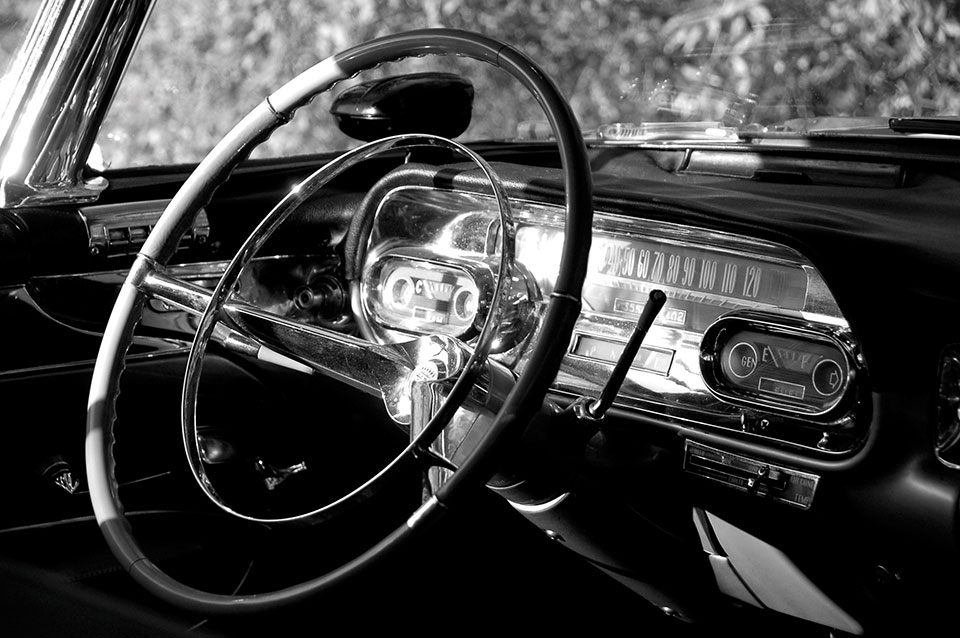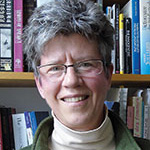The Cadillac

A bar mitzvah brings multiple generations of a family together in celebration, far from the reach of the evil eye.
NEW ROCHELLE, 1954
“Say, would you look at those Dagmars! Aren’t they something!”
Everyone in the family knows Mounya has just bought himself a Cadillac, but knowing is one thing, and seeing is another. What a sight to behold, it’s a beauty! All that chrome, gleaming in the slanted sunlight of a late afternoon in June. The car is two-toned beige, but beige doesn’t begin to describe it. The bottom half is a warm color, like coffee with milk, and the top is pure cream. Magnificent! What class! Look at the gigantic, curved windshield, just a single piece of glass. And those matching bumpers shaped like missiles, the famous Dagmars, named for the actress whose voluptuous breasts, accentuated by the cone-shaped cups of her brassiere, appear regularly on magazine covers. That Mounya, he doesn’t hold back on anything.
The sleek beauty innocently offers herself up to the gaze of all the guests invited to the bar mitzvah of Mounya and Clara’s eldest son. Yesterday, which was Saturday, Michael was called to the Torah for the first time. Such a beautiful, moving occasion, the bar mitzvah of this boy who, having reached the age of thirteen, is now a man in the eyes of Jewish law, a man carrying his paternal grandfather’s name, the grandfather who was assassinated in his Ukrainian village by Petliura’s bandits alongside his youngest son. As the rabbi reminded them all yesterday, this martyred grandfather, before he was killed, asked for enough time to recite the Kaddish for his son. No one’s thinking of that story now. Those who enjoy subjecting themselves to those kinds of memories had plenty of time yesterday at the synagogue. Today is for celebration.
The men tug at suit jackets to smooth out the wrinkles, the women pull at dresses stuck to their thighs. They all mop their faces, run combs through their hair. The women touch up their lipstick.
Clara’s aunts and uncles, her cousins, all the Shackmans (Mounya’s mother and sister are his only family here) have made the sweltering trip up from Brooklyn to New Rochelle with their car windows down so they could breathe, hair mussed and clothes rumpled by the air, which was unbreathable anyway, nauseatingly hot and muggy. They’ve parked their cars up and down the lawn. The men tug at suit jackets to smooth out the wrinkles, the women pull at dresses stuck to their thighs. They all mop their faces, run combs through their hair. The women touch up their lipstick. They make sure that the check or pen (a gold fountain pen, of course), intended for the Bar Mitzvah Boy, is safe in their purse or suit pocket. For most of them, it’s the first time they’ve set foot in Mounya’s and Clara’s new house. But they hardly even glance at the house. They only have eyes for the Cadillac, with its panoramic windshield, its expanse of chrome . . . and those Dagmars.
“Have you seen the interior? Even the steering wheel is two-toned. So classy!”
“And air-conditioning! And a radio!”
“Has anyone seen Clara’s dress?” the women ask, tired of all the talk about Dagmars, tired of imagining what it would be like to be driven around in a Cadillac, cooled by air-conditioning and lulled by the voice of Frank Sinatra. Tired of knowing that this will never be their fate.
Clara’s dress? No one has any idea what it looks like, the dress is a secret. It’s a creation by Aunt Mary Shackman, of course, who for almost thirty years has been clothing the women of the family, transforming them into Hollywood stars.
On the lawn behind the house, an enormous tent has been erected, and underneath, surrounding a dance floor, are circular tables covered with beautiful white cloths, beautiful napkins, beautiful silverware. The band has already begun to play. A bouquet of flowers stands in the center of each table. The guests all look for their seats, wanting to take their places and settle in, curious to know who is sitting next to them. Then they notice that each bouquet is different . . . roses, peonies, carnations . . . and that the little card they were handed at the entry to the tent bears the name of a flower.
An older Shackman cousin who’s come down from Toronto asks a waiter in Yiddish, “What does this mean, mimosa?” The waiter doesn’t speak Yiddish.
What a good idea, tables named for flowers, how pretty! Do you remember the wedding of Cousin David, Uncle Yisroël’s youngest son? No, not at all. Of course you do, David’s wedding when Yasha, may he rest in peace, Clara’s father Yasha, who also went by Jack, stood up after a few drinks and proposed that toast starting with, “Looks like I’m not worthy of being seated at table number one, or even table number two.”
Clara had only been seven years old at the time, but she still remembered her parents’ bitterness, their humiliation at being seated at table number four. At the age of seven, you understand that not everyone can sit at the first table, but later on, how does it make you look to your friends when you have to say, “I was seated at table number four, or was it five?” Maybe that’s why no one remembers that wedding very clearly.
So, Clara decided that no one would ever be subjected to that kind of humiliation at her house. Instead of numbers, the tables would be named for flowers. You’d have to be pretty touchy to get upset over being seated at the mimosa table and not the rose table!
The band plays a slow, popular tune. It doesn’t drown out the strident ostinato of the crickets. It’s warm under the tent, everyone’s going to have fun, there’ll be good food and dancing. Waiters circulate, serving melon halves cut prettily in zigzags. The men haven’t yet tired of talking about the Dagmars, but the women are looking around. Tongues are wagging. Have you seen the triple string of pearls that Cousin Nat, the doctor, bought for his wife? David’s wife must be dying of envy. It’s hard to believe those two are brothers: Nat is so brilliant, and poor David, with his accent from the old country, he’s never left his father’s grocery store, and, believe me, he’ll never get rich there, he doesn’t have Yisroël’s business genius, much less Uncle Guédalia’s. Look, Eileen has a nice string of pearls, too, and she keeps smiling to show everyone she still has dimples, but enough of this gossip, we’re at a bar mitzvah. Speaking of grocery stores, have you noticed that Sally and Lou aren’t here? Even on a Sunday they can’t drag themselves away from their store. I don’t see Ray or Irving, are they still Communists? That hasn’t worked out so well. Shush, don’t talk about that! Say, did you see the chilled melon, what a funny idea, like we’re at some goy party! Couldn’t Clara just serve chicken soup like everyone else? Hot soup, in this heat? That’s crazy! Melon is a great idea. Much fancier than soup.
The men haven’t yet tired of talking about the Dagmars, but the women are looking around. Tongues are wagging.
No one sits down right away to eat their halved melon: the band has struck up a traditional melody, joyous and solemn. Here comes the Bar Mitzvah Boy! He makes his entrance like a groom, his happy parents on either side, one on each arm, almost carrying him. Mounya, with his round Russian peasant face and broad shoulders, beams with pride, and why not, he has everything: he left Brooklyn two years ago for this enormous house in this rich green suburb, he has a beautiful wife, he has a Cadillac with Dagmars, and his son just made his bar mitzvah in an elegant synagogue. Clara, with the smile and bearing of a movie star, glides forward triumphantly on the arm of her eldest son, wearing a silk organza gown in green-bronze. No, not bronze, it’s much prettier than bronze, it’s moss-green, with a flared skirt just stiff enough to keep its shape. Look how low it’s cut, she’s barely covered by that see-through organza. And the matching stole, she’s draped it over her shoulders like a queen. Mary has outdone herself this time. Not surprising. Clara has always been her favorite niece.
The cousins admit, because it must be admitted, that Clara is still quite slender for a woman who’s brought four children into the world. She can get away with a cinched waist and a flared skirt. And did you see that bow on her belt?
Couldn’t Clara just serve chicken soup like everyone else? Hot soup, in this heat? That’s crazy!
Now Mounya and Clara circulate separately among the tables, welcoming guests with a kind, even affectionate word, and thanking them for having come all this way to share in their great joy. They are accompanied by the photographers.
The men congratulate Mounya, clapping him on the back. Mazel tov! Wonderful party, very nice. And that Cadillac is really something!
“Have you looked inside?” asks Mounya. “Did you see I’ve got air-conditioning and a radio?”
It’s not just the men talking about the Cadillac. The women are, too. They say to Clara, “So, now you have a Cadillac! Does Mounya let you drive? Do you run your errands and go get your hair done in the Cadillac? Mazel tov, you hit the jackpot!”
“Have you looked inside?” asks Clara. “Did you see that the seats are not real leather? It doesn’t matter, you can’t have it all,” she says, beaming with the smile of a woman who has it all.
Clara has started her rounds at the table where her cousins are seated. They hardly have time to dig into their melon before some of them, including Samuel “Sam” Weitzner and his wife, Molly, née Shackman, must stand back up, come around the table, and line up for the photographer.
“Yes, now look at me, give me a beautiful smile,” orders the photographer, and it is thanks to him that, years later, I can take my time with a magnifying glass and examine Sam and Molly Weitzner, who would later become my in-laws.
Clara is posing next to Sam. They are standing behind cousin Nat, the doctor. Molly is behind her sister, Eileen.
“Look at me and smile,” repeats the photographer.
Clara, fulfilled wife and mother, smiles for the camera, flashing her movie-star teeth. American teeth. No one back in the old country ever had teeth like that. Eileen gives her loveliest smile, so happy to be pretty and still able to show off her dimples, despite closing in on her forty-fifth year. She’s also pleased because less than ten minutes of conversation have made it clear that she is the only one among her sisters and cousins (other than Clara, of course) to have a cleaning lady. Eileen’s husband, Max, a big strapping fellow with a baby face, grins like a man who likes to have fun. Cousin Nat, sporting a thin Latin mustache, somewhat strange for a Jewish doctor, smiles with satisfaction: his office is in one of Brooklyn’s best neighborhoods, and he has recently given a triple-strand pearl necklace to his wife, who is also smiling with satisfaction. The others, cousin David with his accent from the old country, his wife, and the cousins from Toronto, smile as best they can.

Clara, fulfilled wife and mother, smiles for the camera, flashing her movie-star teeth. American teeth. No one back in the old country ever had teeth like that.
Sam Weitzner, my future father-in-law, is staring off into space, not smiling. He is bored. He’s not deaf, so he can’t escape the music. Is he dreaming of his beautiful saxophone, the beloved saxophone that he had to sell exactly twenty-five years ago during the Great Depression in order to eat? Why hasn’t he ever bought a new one?
This is a question that I’ll ask many years later. At the time of this magnificent family party, just like later on when I become part of this family, no one shows any interest in the saxophone, or in the saxophonist’s talent, or in anything else concerning Sam Weitzner.
Molly, my future mother-in-law, tries to smile, but all she can manage is a twisted half-grin that is closer to a grimace. Is she happy for her first-cousin Clara, blooming and resplendent in the green dress that goes so well with her eyes? Is she happy for this cousin covered with furs, ensconced in a beautiful house surrounded by lawns, and driven about in an air-conditioned Cadillac by her mocky husband, with his awful, fresh-off-the-boat accent that somehow didn’t stop him from being a huge success? Molly should be happy, of course, but isn’t there some story of another green dress, a crêpe-de-chine dress that was coveted by Molly but given to Clara, a story going back to the time when they were girls and Bubba Esther was still alive, a story I’ll come back to later on, an old story that has left a stain in Molly’s memory like a dirty ring in a glass that someone forgot to rinse?
What is Molly thinking about behind that twisted smile? It’s not hard to guess, she’s dreaming of the day when she’ll be the mother of the Bar Mitzvah Boy. She’ll dance with her son, her Ricky, and wear a red taffeta dress.
Three years ago, when Eileen married off her eldest daughter, Aunt Mary made (or had her seamstresses make) a dress of ravishing red taffeta—strapless and bare-shouldered, with a small Victorian bustle, just like in the olden days! Molly could do without the bustle, but the red taffeta . . .
While other guests are drinking and laughing, some of them sincerely happy for their hosts’ good fortune, Molly is not wasting any time. She examines and keeps a mental record of every detail: the menu, the dress styles (low-cut or not), the candles, the flower centerpieces, the china, the number of waiters, and the size of the orchestra. She probably even counts the guests, there are at least a hundred, including two rabbis, Mounya’s lawyer, the family doctor, and their respective wives.
All this costs a fortune, poor Sam won’t be able to buy us this kind of party, I’ll have to ask Papa, thinks Molly, who wants nothing but the best for her Ricky. She glances over at the table where her father, Guédalia Shackman, is drinking and joking around with his brother, Rieven, and his sister, Mary. Molly has nothing to worry about, Guédaelia loves a good party, and Eric is his favorite grandson.
All this explains why Molly hasn’t had time to think about her smile, to shift her grimace into an actual smile. She is way too busy planning an extravagant bar mitzvah for a small boy who, in June 1954, is only five years old, but who will someday be my husband. To his mother’s great displeasure. I might as well say that right now.
Eric? You mean Ricky? That’s what the family always called him. Later, when he went away to school and was such a brilliant student, he asked people to call him Eric, that’s only to be expected, but for us he’ll always be Ricky. Ricky was the apple of his mother’s eye, an adorable little man with curly black hair and such intelligent eyes, just like Grandfather Guédalia’s eyes. You should’ve seen our little Ricky the day of Michael’s bar mitzvah, so cute in his red velvet jacket. Did Aunt Mary make that jacket? Probably not, she and Molly were not on very good terms and hadn’t been for over fifteen years. That’s another story I’ll come back to later.
The adorable little man has shed his red jacket because he was too hot and is now fast asleep in his father’s arms. Not even the wild rhythms of the jitterbug will wake him.
Can you even get melon in the month of May? wonders Molly, as Eric was born on May 8, so his bar mitzvah will have to be in that month. Molly is one of those who thinks the melon is chic, and she wants the best for her Ricky!
In the meantime, little Ricky is sleeping, his head nestled in Sam’s arm, as Sam stares into space, perhaps dreaming of his saxophone, or of the house he could’ve bought after the war, when houses were less expensive and soldiers could get GI loans. It’s possible that the continuous soothing chirps of the crickets, which fill the air whenever the orchestra falls silent, have stirred in him a longing for the house he will never own. If only he’d been able to convince Molly. He’d tried for months, every evening, talking of nothing else. A house of their own. But his wife stubbornly refused to leave Brooklyn and her parents. She had won out in the end, proud to be the daughter who would never leave her parents.
The older relatives are sitting at a table together. They hold themselves erect, these last survivors of the children of Esther and Shmiel-Haïm Schackman. Guédalia and Rivka, Molly’s parents, are there, and so is Rieven Shackman, his eyes pale and tired, long ago separated from his wife. The two brothers look alike, thin faces under dark yarmulkes. Their sister Pessie, Clara’s mother, died several years ago, followed soon after by her dear Yasha. Their brother Yisroël is dead, but his widow, Hessie, the pious daughter and granddaughter of scribes from back over in Uman, is there. She’s sitting straight-backed and dignified, dressed in black, a white lace collar around her neck, her gray hair pulled back tight in a bun. Who would guess that she’s just treated herself to a television and now spends her evenings watching cowboy movies? She’s seated next to a chubby, cheerful woman whose bare shoulders peek out of a colorful flower-print dress. “At your age, Manya?” Bubba Esther would have said. “At your age, the dress of a young girl? You don’t think.” But Bubba Esther has been gone a long time, and Mary, who dresses the whole family, wears whatever she wants to wear.
What are the old people speaking of? Guédalia loves professional wrestling and recounts the latest match of “Killer” Kowalski to make everyone laugh. Hessie talks about cowboy movies. They don’t mention the Cadillac, other than to exclaim, “Yisroël would’ve loved it, he loved anything mechanical!”
Rivka keeps quiet. Never a talkative person, Rivka. None of it interests her anyway, not wrestling nor cowboys nor the Cadillac. She’s just happy to see the Shackmans reunited, multiple generations in good health, the women wearing pretty dresses, and all these children, real little Americans, boisterous, joyful, and self-assured. Kinehora, evil eye be gone, far from us and our family.
Translation from the French
Read a translator's note by Lynn E. Palermo on the creative challenges of translating Weil's work.













